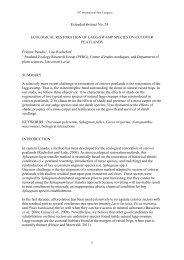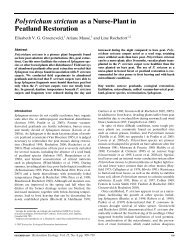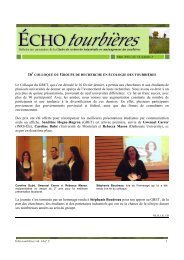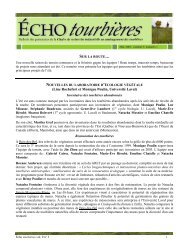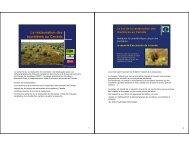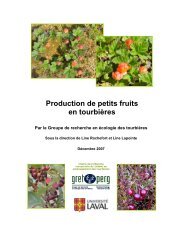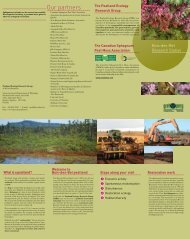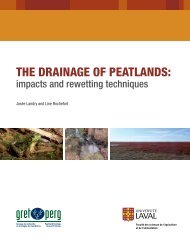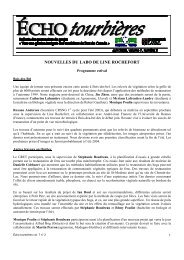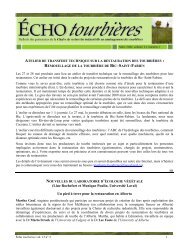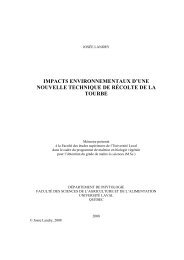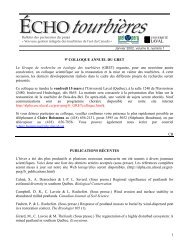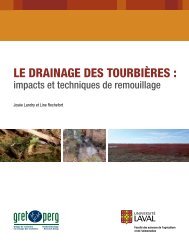wise use of mires and peatlands - Peatland Ecology Research Group
wise use of mires and peatlands - Peatland Ecology Research Group
wise use of mires and peatlands - Peatland Ecology Research Group
You also want an ePaper? Increase the reach of your titles
YUMPU automatically turns print PDFs into web optimized ePapers that Google loves.
118 VALUES AND CONFLICTS: WHERE DIFFERENT VALUES MEETperson -1 yr -1 (White & Lovett 1999).111Gren et al. 1995.112Costanza et al. 1997.113Thibodeau & Ostro 1981.114Thibodeau & Ostro 1981.115Hampicke & Schäfer 1997.116Costanza et al. 1997.117Costanza et al. 1997.118Costanza et al. 1997.119Costanza et al. 1997.120Using $2 – 35 kg -1 N (Gren 1995, Byström 1998)<strong>and</strong> emission rates <strong>of</strong> 7,540 – 49,600 kg N km -2y -1 (Gelbrecht et al. 2000).121Using $5 - 25 t -1 C (Tol 1999a) (with ratiosbetween the marginal costs <strong>of</strong> CO 2<strong>and</strong> those <strong>of</strong>CH 4<strong>and</strong> N 2O equal to the global warmingpotentials <strong>of</strong> these gases, cf. Tol 1999b) <strong>and</strong> acumulative radiative forcing <strong>of</strong> 2,928 – 10,334CO 2-C-kg-equivalents ha -1 y -1 (Augustin 2001).The aggregated monetarised damage due toclimate change has been estimated at 1.5 to 2.0percent <strong>of</strong> World GNP; the OECD would lose 1.0to 1.5 percent <strong>of</strong> GDP; the developing countries2.0 to 9.0 percent. These figures are notcomprehensive <strong>and</strong> are highly uncertain. Recentstudies increasingly emphasise adaptation,variability, the rate <strong>of</strong> change, extreme events,other (non-climate change) stress factors, <strong>and</strong>the need for integrated assessment <strong>of</strong> damages.As a result, differences in estimated impactsbetween regions <strong>and</strong> sectors have increased, themarket impacts in developed countries havetended to fall, <strong>and</strong> non-market impacts havebecome increasingly important.Whether it is fast or slow, climate change is likelyto have greater economic impacts on poorcountries than on rich countries. On the whole,market impacts fall relative to economic growthwhile non-market impacts rise relative to growth(http://www.gcrio.org/gwcc/toc.html).122Capital investment costs recalculated to annualcosts using an interest rate <strong>of</strong> 6%.123IPCC 1996.124Primavera 2000.125Primavera 2000.126See also discussions in Costanza et al. 1997.127Cf. the exclamation “my kingdom for a horse”in Shakespeare ’s King Richard III, V, iv, 7. Theanswer to the question: “How can you monetarise‘nature’, ‘biodiversity’, or ‘the environment’ “is simply: “you cannot”. The same answer,however, also applies to everyday necessities suchas food, drinking water, or shelter. To ask thequestion how much poorer the world would bewithout any food or without biodiversity is absurd(cf. Costanza et al 1997). In daily practice,however, a loaf <strong>of</strong> bread, a litre <strong>of</strong> water, <strong>and</strong> aho<strong>use</strong> is replaceable <strong>and</strong> hence does have a price.Similarly a peatl<strong>and</strong> can have a monetarised valuefor tourism, for education, for energy generation,etc., a price that is dependent on dem<strong>and</strong> <strong>and</strong>scarcity (Mitsch & Gosselink 2000).128Cf. the recent discussions <strong>of</strong> the role <strong>of</strong> peatl<strong>and</strong>sin climate change (Gorham 1991, Franzén 1994,Crill et al. 2000).129Cf. MacGillivray 1998, who shows that even indepressed areas there is a strong appreciation thatthere is more to happiness, welfare or quality <strong>of</strong>life than cash income. This appreciation includesa recognition <strong>of</strong> the value <strong>of</strong> such qualities ashealth, security, st<strong>and</strong>ard <strong>of</strong> living, education, <strong>and</strong>environment.130For example, one might accept the killing <strong>of</strong>farmed rabbits for eating while not accepting thekilling <strong>of</strong> a child’s pet rabbit. Cf. Brennan 1992.131Norton 1987.132I.e. in general, people dislike losing a benefit morethan they like gaining the same benefit.133Brennan 1992. There may, for example be largedifferences between the perspective <strong>of</strong> a personas a consumer <strong>and</strong> <strong>of</strong> the same person as a citizen,for example in her attitude towards rules <strong>and</strong>regulations. The decision to have or not to havepeat extracted in a country concerns the politicalquestion <strong>of</strong> what limits should be placed on thesatisfaction <strong>of</strong> consumer preferences. The decisionto buy a bag <strong>of</strong> compost containing peat, when itis available on the market, concerns merely thesatisfaction <strong>of</strong> individual preferences within theselimits (Cf. Norton 1987).A person in her role as palaeo-ecologist mayprefer the view <strong>of</strong> a bog while it is being exploited,beca<strong>use</strong> the exposure <strong>of</strong> peat pr<strong>of</strong>iles allowsoptimal access to stratigraphical information (cf.Casparie 1972, Barber 1981). The same personin her role as conservationist may prefer to seepristine bogs.134See §3.2.135Cf. §4.7.136Cf. the large sums currently spent on mirerestoration in West <strong>and</strong> Central Europeancountries which clearly show that present daysociety values things different from society only30 years ago.137Based on Costanza et al. 1998 <strong>and</strong> Hampicke2000b.138Cf. Rees (1998): “…at this critical stage <strong>of</strong> worlddevelopment, we must regard many <strong>of</strong> nature’sservices as we would an expensive yacht. If wehave to ask the price, we probably can’t affordit.”139Fear that “intermediate” generations might“hijack” the funds is no reason to refrain fromproviding them, beca<strong>use</strong>– our duty to mitigate the consequences <strong>of</strong> ouractions exists, independent <strong>of</strong> what futuregenerations may do. If they ab<strong>use</strong> the funds,they are responsible for the ensuing suffering.If we do not start to invest, we are;– instead <strong>of</strong> in bank accounts, we may as wellinvest in technical progress. This mightimprove the capacity to solve problems moreefficiently <strong>and</strong> is less reversible than thestockpiling <strong>of</strong> money (Hampicke 2000).140cf. Tol 1999b. See §5.6.5 (2).141The decision on the correct method <strong>of</strong>discounting is independent <strong>of</strong> whether the presentgeneration is actually going to pay for futuredamages or not. If it appears after thoroughcalculation that the present costs are relatively



